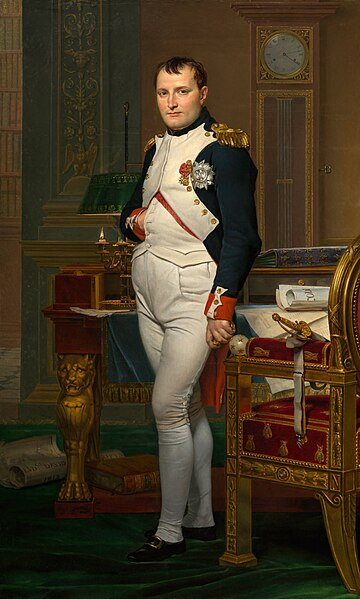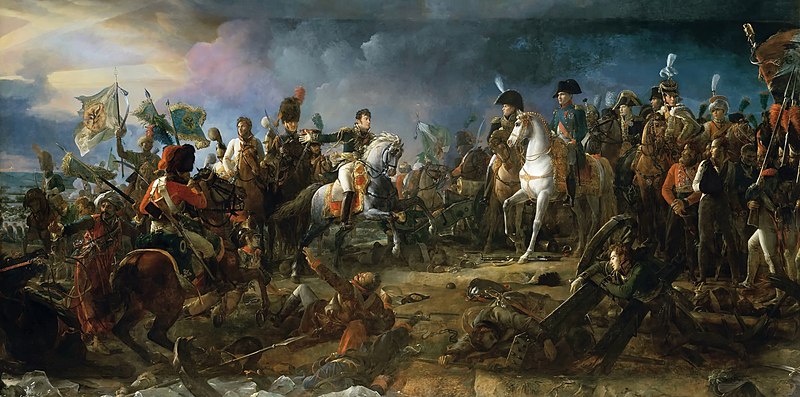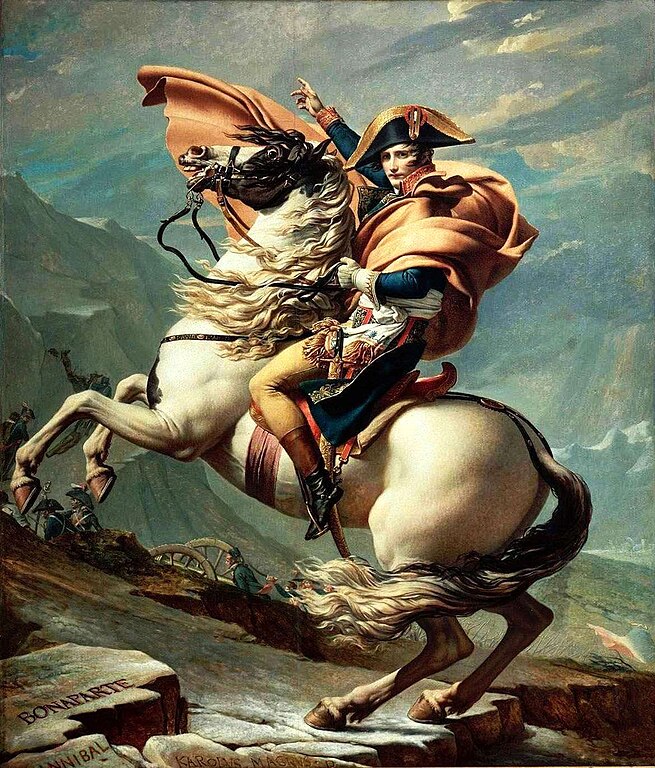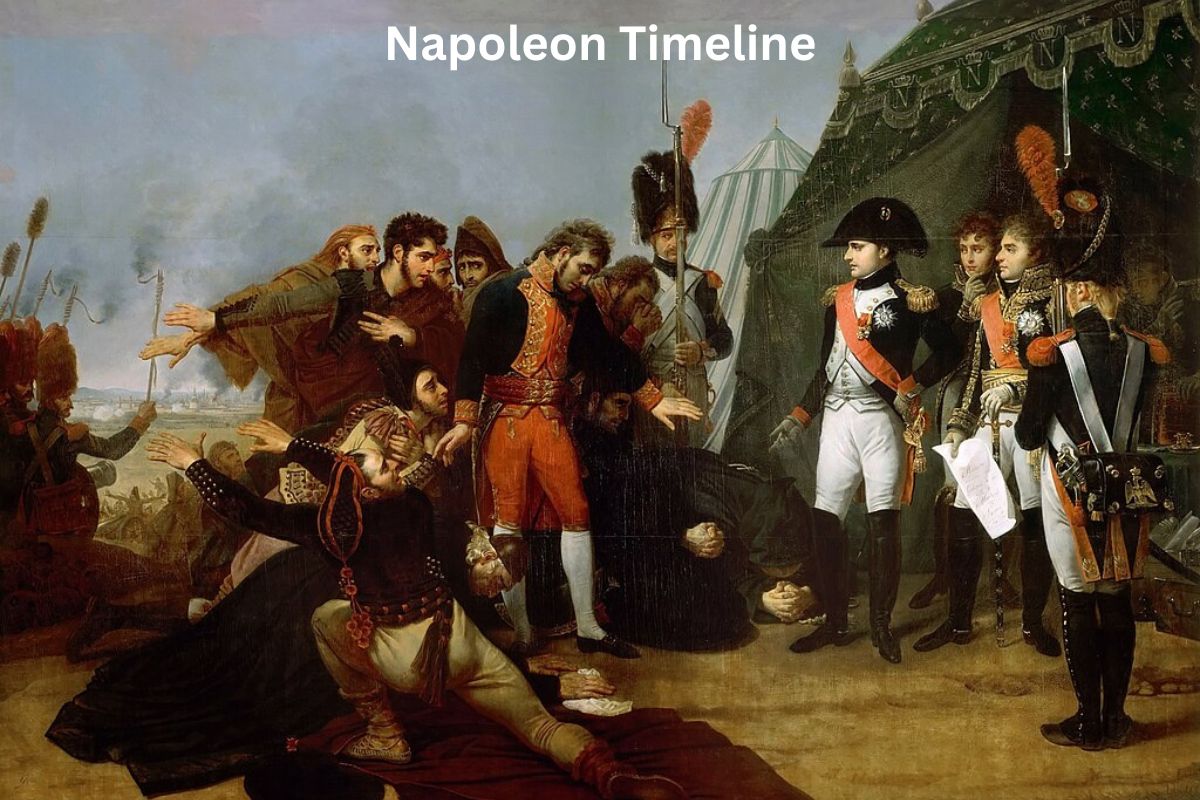Napoleon Bonaparte, a towering figure in European history, was born in Corsica in 1769. His rise from a humble Corsican family to becoming Emperor of the French marked an era of profound change.
As a brilliant military strategist and charismatic leader, he reshaped Europe through his conquests and reforms.
From his early military successes to his eventual downfall and exile, Napoleon’s journey is one of ambition, power, and enduring influence.
| Year | Event |
|---|---|
| 1769 | Born on August 15 in Corsica. |
| 1784 | Enrolls in the Royal Military Academy in Brienne-le-Château. |
| 1785 | Graduates and becomes a second lieutenant in the artillery. |
| 1793 | Defends the French National Convention during the Revolution. |
| 1796 | Appointed commander of the French Army of Italy, achieves victories against Austrians. |
| 1798 | Leads unsuccessful Egyptian campaign to disrupt British access to India. |
| 1799 | Returns to France, executes the 18 Brumaire coup, becomes First Consul. |
| 1802 | Becomes Consul for Life. |
| 1804 | Crowns himself Emperor of the French. |
| 1805 | Wins Battle of Austerlitz in War of the Third Coalition. |
| 1806-1807 | Victories in War of the Fourth Coalition, Treaty of Tilsit with Russia. |
| 1812 | Disastrous invasion of Russia leads to Grand Army’s downfall. |
| 1813 | Faces defeats, including Battle of Leipzig, begins retreating from German territories. |
| 1814 | Abdicates, exiled to Elba, Bourbon monarchy restored in France. |
| 1815 | Escapes from Elba, returns to power for the Hundred Days. Defeated at Battle of Waterloo. |
| 1815 | Abdicates again, exiled to Saint Helena. |
| 1821 | Dies in exile on Saint Helena on May 5 due to stomach cancer. |
Timeline of Napoleon Bonaparte
1769 – Born on August 15 in Corsica
Napoleon Bonaparte was born on the island of Corsica, which was under French control at the time. His family had Corsican and Italian roots. He received a French education and showed an early interest in military matters.

1784 – Enrolls in the Royal Military Academy
At the age of 15, Napoleon left Corsica to attend the Royal Military Academy in Brienne-le-Château, France.
Also Read: Facts About Napoleon
Despite his Corsican background and initially struggling with the French language, he excelled in mathematics and became known for his determination and independent thinking.
1793 – Defends the French National Convention during the Revolution
With the outbreak of the French Revolution, Napoleon returned to France and joined the revolutionary cause.
Also Read: Accomplishments of Napoleon Bonaparte
He showed his tactical skills during the Siege of Toulon in 1793, where he played a key role in recapturing the city from counter-revolutionary forces.
1796 – Commands the French Army of Italy and achieves victories
In 1796, Napoleon was given command of the French Army of Italy. He implemented innovative tactics and strategies, winning a series of impressive victories against Austrian and Sardinian forces. These successes brought him into the public eye and earned him the nickname “The Little Corporal.”
1799 – Executes the 18 Brumaire coup, becomes First Consul
By 1799, France was facing political instability and economic challenges. Napoleon saw an opportunity to seize power and stabilize the country.
On November 9, 1799 (18 Brumaire in the French Revolutionary calendar), he staged a coup d’état, dissolving the existing government and establishing a new one known as the Consulate.
Napoleon became the First Consul, effectively the ruler of France. This marked the beginning of his rise to political prominence.

1802 – Becomes Consul for Life
In 1802, Napoleon consolidated his power further by having himself declared Consul for Life through a national plebiscite. This move effectively made him the permanent leader of France, with significant authority over the government and its institutions.
1804 – Crowns himself Emperor of the French
Building on his growing authority, Napoleon took a significant step in solidifying his rule. On December 2, 1804, in a grand ceremony at the Notre Dame Cathedral in Paris, Napoleon crowned himself Emperor of the French. This act demonstrated his control over both political and religious aspects of the state.
1805 – Wins Battle of Austerlitz in the War of the Third Coalition
The year 1805 marked the beginning of a new phase of conflict with other European powers, known as the War of the Third Coalition.
In December, Napoleon’s forces achieved a decisive victory at the Battle of Austerlitz against combined Russian and Austrian forces. This battle further established Napoleon’s reputation as a military genius.
1806-1807 – Victories in War of the Fourth Coalition, Treaty of Tilsit with Russia
Victories in the War of the Fourth Coalition, Treaty of Tilsit with Russia. In subsequent years, Napoleon’s forces continued to achieve victories, including the Battle of Jena-Auerstedt against Prussia.
These successes led to the dissolution of the Holy Roman Empire and the creation of the Confederation of the Rhine. In 1807, the Treaties of Tilsit were signed with Russia, solidifying Napoleon’s control over much of continental Europe and forming an alliance with Russia.
1812 – Invades Russia, faces disastrous losses
Despite his successes, one of Napoleon’s most infamous decisions occurred in 1812 when he launched an invasion of Russia with the goal of forcing Tsar Alexander I to comply with his policies.
However, the Russian forces employed a scorched-earth strategy, retreating and destroying resources as they went. As winter set in, Napoleon’s forces faced severe cold, hunger, and Russian resistance, resulting in catastrophic losses and the near destruction of the Grand Army.

1814 – Abdicates, exiled to Elba; Bourbon monarchy is restored
The disastrous Russian campaign of 1812 weakened Napoleon’s position considerably. In 1814, a series of defeats by the Sixth Coalition forces, including the Battle of Leipzig, forced him to abdicate the throne on April 11. He was exiled to the island of Elba in the Mediterranean, and the Bourbon monarchy was restored in France under King Louis XVIII.
1815 – Escapes, returns briefly, defeated at Waterloo; abdicates and is exiled to Saint Helena
In a surprising turn of events, Napoleon managed to escape from Elba in February 1815 and returned to France. This period is known as the Hundred Days. Although he initially regained some support, he faced a coalition led by the Duke of Wellington and Prussian forces.
At the Battle of Waterloo on June 18, 1815, Napoleon suffered a decisive defeat. He abdicated for the second time and was exiled to the remote island of Saint Helena in the South Atlantic, where he would spend the rest of his life.
1815-1821: Life in exile on Saint Helena
Napoleon’s time on Saint Helena was marked by his isolation and confinement. He lived in a small house called Longwood, where he spent his days reading, dictating his memoirs, and engaging in discussions with those around him. His health deteriorated during this period, and he was plagued by health issues.
1821 – Dies in exile on Saint Helena on May 5 due to stomach cancer.
Napoleon Bonaparte passed away on May 5, 1821, at the age of 51. The official cause of death was listed as stomach cancer. His death marked the end of an era and the closing chapter of his tumultuous life. He was buried on the island of Saint Helena, and his remains would later be returned to France in 1840, where they were interred in a grand tomb at Les Invalides in Paris.
